(完整版)一般将来时初中语法
(完整版)初中一般将来时讲解

(完整版)初中一般将来时讲解初中一般将来时是英语中表达将来时间的一种时态,它用来表示将来某个时间将要发生的动作、事件或情况。
本文将对初中一般将来时进行详细讲解。
一、构成初中一般将来时的构成主要由以下几个部分组成:1. 助动词“will”,用于表示将来。
2. 动词的原形(即不带to的动词原型)。
二、用法初中一般将来时主要有以下几种用法:1. 表示将来的计划或意图。
例如:- I will study harder in order to pass the exam. - They will go on a trip next week.2. 表示预测或推测。
例如:- It will rain tomorrow.- The team will win the game.3. 表示承诺或意愿。
例如:- I will help you with your homework.- We will support you all the way.4. 表示意愿或请求。
例如:- Will you please open the window?- I will go shopping if you want.三、注意事项在初中一般将来时的使用中,需要注意以下几点:1. 助动词“will”后面直接接动词的原形,不带任何变化。
2. 否定句在助动词“will”后面加上“not”构成,缩写形式为“won't”。
3. 疑问句将助动词“will”提到句子的主语之前。
四、例句以下是一些初中一般将来时的例句:1. I will travel to Japan next year.3. Will you go to the beach tomorrow?五、总结初中一般将来时是英语中一种表示将来时间的时态。
在使用时,需要注意助动词“will”的使用以及动词的原形。
它可以用于表示计划、预测、承诺等。
希望本文能够对您的学习有所帮助。
初中英语语法课件 一般将来时

被动语态
b. be going to be done A beautiful dinner is going to be made by Jackie tonight. 杰基今晚将做一顿丰盛的晚餐。 We all think that he is going to be transferred. 我们都认为他将被调任。
They are not going to visit the primary schare+ not+ going to+动词原形
下周一他们不去参观那所小学了。
Is she going to be a teacher in the future? 疑问句: Am/ ls/ Are+主语+ going to+动词原形
2 一般将来时的用法
(1) be going to do结构 表示打算、计划要做的事或有迹象表明要发生的事。 I ’m going to ski tomorrow.明天我要去滑雪。(计划、打算) It’s going to be a fine day tomorrow. 明天将会是个好天气。(迹象表明要发生)
You will not help him later. 你以后不会帮他的。
We will not going to have a picnic.
我们不打算去野餐。
will not=won’t
一般疑问句
一般疑问句: a. Be(am/is/are) + 主语 + going to + 动词原形 Is he going to meet Sally tonight? 他今晚要去见萨莉吗?
(2) will/ shall do结构 will/ shall do结构表示未经过事先考虑的意图,当主语是第一人 称时用 shall, will可用于各种人称。 How long will the work take?这项工作要花多长时间?(推测) From now on I will/ shall come for the newspapers every Monday. 从现在起,我每周一都来拿报纸。(打算)
(完整版)初中基础语法一般将来时、be_going_to用法.doc
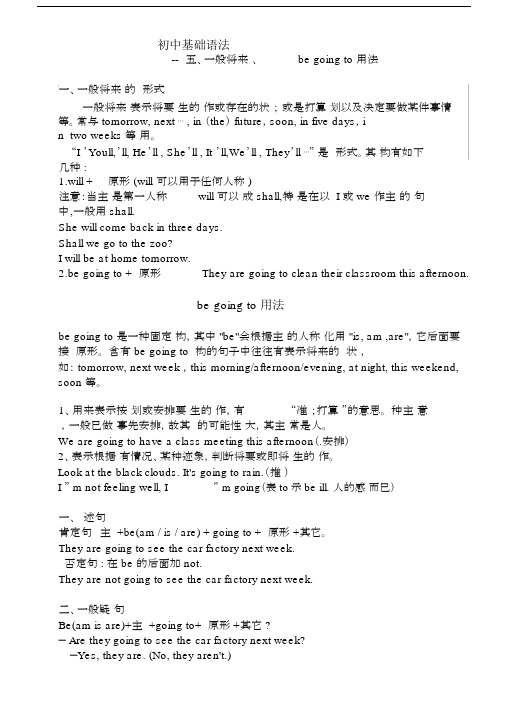
初中基础语法--五、一般将来、be going to 用法一、一般将来的形式一般将来表示将要生的作或存在的状;或是打算划以及决定要做某件事情等。
常与 tomorrow, next ⋯ , in (the) future,soon, in five days,in two weeks 等用。
“I ’Youll,’ll, He’ll , She’ll , It ’ll,We’ll , They’ll ⋯”是形式。
其构有如下几种 :1.will +原形(will可以用于任何人称)注意:当主是第一人称will 可以成 shall,特是在以 I 或 we 作主的句中,一般用 shall.She will come back in three days.Shall we go to the zoo?I will be at home tomorrow.2.be going to +原形They are going to clean their classroom this afternoon.be going to 用法be going to 是一种固定构,其中 "be"会根据主的人称化用 "is, am ,are",它后面要接原形。
含有 be going to 构的句子中往往有表示将来的状,如: tomorrow, next week ,this morning/afternoon/evening, at night, this weekend, soon 等。
1、用来表示按划或安排要生的作,有“准;打算”的意思。
种主意,一般已做事先安排,故其的可能性大,其主常是人。
We are going to have a class meeting this afternoon(.安排)2、表示根据有情况、某种迹象,判断将要或即将生的作。
Look at the black clouds. It's going to rain.(推)I ” m not feeling well, I” m going(表to示be ill.人的感而已)一、述句肯定句主+be(am / is / are) + going to +原形+其它。
初中英语一般将来时
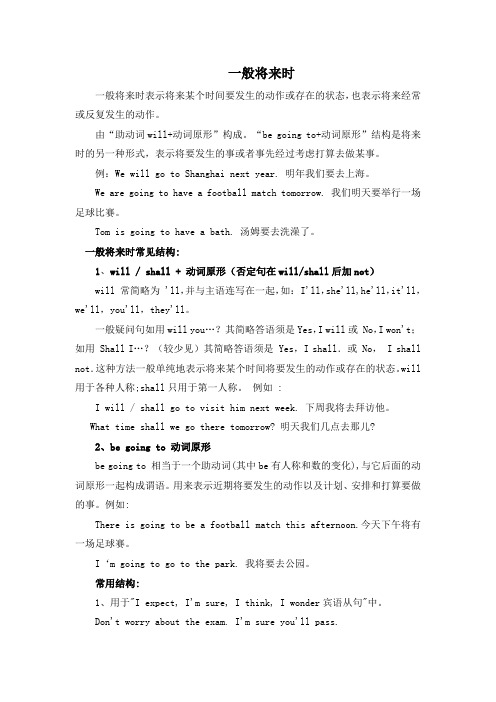
一般将来时一般将来时表示将来某个时间要发生的动作或存在的状态,也表示将来经常或反复发生的动作。
由“助动词will+动词原形”构成。
“be going to+动词原形”结构是将来时的另一种形式,表示将要发生的事或者事先经过考虑打算去做某事。
例:We will go to Shanghai next year. 明年我们要去上海。
We are going to have a football match tomorrow. 我们明天要举行一场足球比赛。
Tom is going to have a bath. 汤姆要去洗澡了。
一般将来时常见结构:1、will / shall + 动词原形(否定句在will/shall后加not)will 常简略为 'll,并与主语连写在一起,如: I'll,she'll,he'll,it'll,we'll,you'll,they'll。
一般疑问句如用will you…?其简略答语须是Yes,I will或 No,I won't;如用 Shall I…?(较少见)其简略答语须是 Yes,I shall.或 No, I shall not.这种方法一般单纯地表示将来某个时间将要发生的动作或存在的状态。
will 用于各种人称;shall只用于第一人称。
例如 :I will / shall go to visit him next week. 下周我将去拜访他。
What time shall we go there tomorrow? 明天我们几点去那儿?2、be going to 动词原形be going to 相当于一个助动词(其中be有人称和数的变化),与它后面的动词原形一起构成谓语。
用来表示近期将要发生的动作以及计划、安排和打算要做的事。
例如:There is going to be a football match this afternoon.今天下午将有一场足球赛。
初中英语语法一般将来时

初中英语语法一般将来时一是表示将来的决定、承诺、意愿或预测;二是表示将来的惯或经常性动作;三是表示将来的突发事件。
going to则强调现在已经有了计划、安排或打算,即已经准备好要做某事了。
例如:I will call you later.(我会给你打电话。
)表示决定或承诺。
He will be a great doctor one day.(他将来会成为一名伟大的医生。
)表示预测。
I will always love you.(我将永远爱你。
)表示意愿。
We will have a meeting every Monday.(我们每周一都会开会。
)表示惯或经常性动作。
I will help you if you need it.(如果你需要,我会帮助你。
)表示突发事件。
She is going to study abroad next year.(她明年要出国留学。
)表示已经有了计划或打算。
一般现在时表示将来通常用于表示时间表或日程安排。
The train leaves at 8 am tomorrow.明天早上8点火车离开。
The conference starts on Monday.会议从星期一开始。
I have a dentist appointment next week.我下周有牙医约会。
1.The train will leave at six tomorrow morning。
indicating a future event that has already been led.2.The use of the future tense can also be seen in time or nal clauses。
as in "I'll write to you as soon as I arrive there" and "If it doesn't rain tomorrow。
(完整版word)七年级英语句型及语法(英语一般将来时)及解析

(完整版word)七年级英语句型及语法(英语一般将来时)及解析一、初中英语一般将来时1.— Excuse me. Could you tell me ?— It will leave at 4:00 p.m.A. how will you go to ShanghaiB. how you will go to ShanghaiC. when the bus would leave for ShanghaiD. when the bus will leave for Shanghai【答案】 D【解析】【分析】这是一道根据回答写出问句所缺成分的题目,阅题时要仔细分析回答的句子。
句意:打扰一下,你能告诉我这辆公交车什么时候动身前往上海吗?它将会在下午4点的时候离开。
据回答知问句问的是时间,故排除A和B。
由题知,句子是一般将来时,故问句中也要用一般将来时态。
故选D。
【点评】本题需要考生根据回答反推问题,在阅题时要仔细审题。
2.-- Tommy, do you know if they _____ to the zoo this Sunday if it _____?-- Sorry, I have no idea.A. will go; is fineB. go; is fineC. will go; is going to be fineD. go; will be fine【答案】 A【解析】【分析】句意:——Tommy,你知道这个星期天如果晴天他们是否去动物园吗?——对不起,我不知道。
第一个空前的if引导宾语从句,意思是“是否”,根据从句的tomorrow可知用一般将来时;第二个空前的if引导条件状语从句,意思是“如果”,从句中用一般现在时表示将来,故选A。
【点评】考查动词的时态。
3.Hold your dream,_____ you might regret some day.A. andB. orC. butD. so【答案】 B【解析】【分析】考查连词.句意:坚持你的梦想,___有一天你会后悔的。
(完整版)初中一般将来时讲解.docx
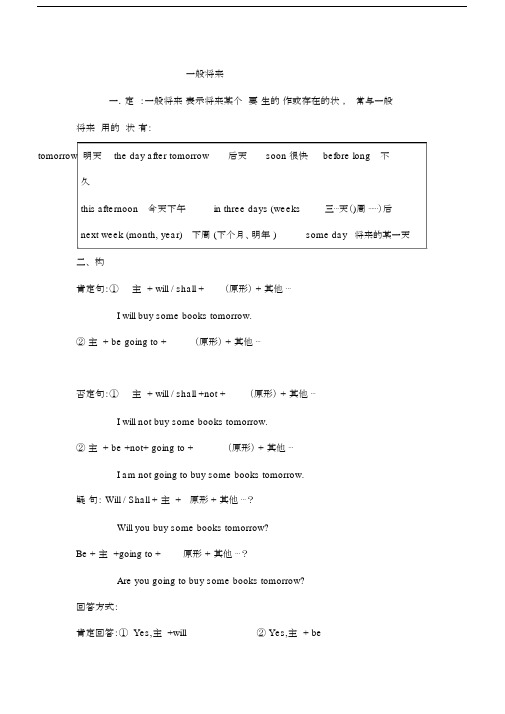
一般将来一.定:一般将来表示将来某个要生的作或存在的状,常与一般将来用的状有:tomorrow 明天the day after tomorrow后天soon 很快before long不久this afternoon今天下午in three days (weeks三⋯天()周⋯⋯)后next week (month, year)下周(下个月、明年)some day将来的某一天二、构肯定句:①主+ will / shall +(原形)+其他⋯I will buy some books tomorrow.②主 + be going to +(原形)+其他⋯否定句:①主+ will / shall +not +(原形)+其他⋯I will not buy some books tomorrow.②主 + be +not+ going to +(原形)+其他⋯I am not going to buy some books tomorrow.疑句: Will / Shall + 主 + 原形 + 其他⋯?Will you buy some books tomorrow?Be + 主 +going to +原形+其他⋯?Are you going to buy some books tomorrow?回答方式:肯定回答:① Yes,主 +will② Yes,主+ be否定回答:① No, 主 +will +not② No,主+be + not特殊疑句:特殊疑+shall /will+主+原型+其他⋯Where will you go next week?下星期你去哪?What shall I do? 我怎么呢 ?How many books will they get?他将有多少本?三区.will, be going to⋯, be to(高⋯中), be about to(初中)⋯1.be going to + 不定式,表示将来。
(完整版)初中英语语法一般将来时态

与一般将来时连用的时间状语
tomorrow 明天 the day after tomorrow 后天 soon 很快
this year 今年 next week 下周 in the future 将来
in three days 三天后
in ten minutes 在一般将来时 中用IN 表示在多久以后
What are they going to do this evening? They are going to watch TV.
What is the bear going to do tomorrow?
It is going to cook dinner.
What are they going to do ?
There will be only one country. 否定句:在will后面加not.
There won’t be only one country. 一般疑问句:把will提到there之前。
Will there be only one country? Yes, there will. / No, there won’t.
一般将来时的主要用法:
1、表示将来某一时刻的动作或状态: We will come to see you the day after tomorrow. There will be a wonderful show next week.
2、表示将来某一段时间内经常的动作或状态: The students will come and work in the lab once a
They will do heavy work.
They won`t do Will they do heavy work. heavy work?
(完整版)一般将来时初中语法
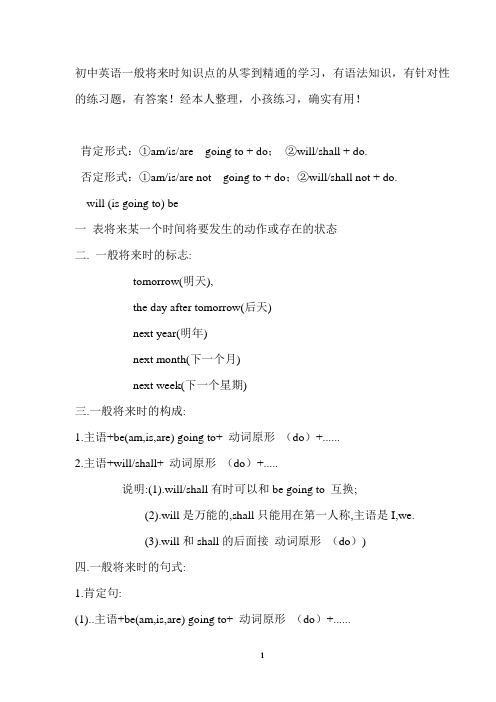
初中英语一般将来时知识点的从零到精通的学习,有语法知识,有针对性的练习题,有答案!经本人整理,小孩练习,确实有用!肯定形式:①am/is/are going to + do;②will/shall + do.否定形式:①am/is/are not going to + do;②will/shall not + do.will (is going to) be一表将来某一个时间将要发生的动作或存在的状态二. 一般将来时的标志:tomorrow(明天),the day after tomorrow(后天)next year(明年)next month(下一个月)next week(下一个星期)三.一般将来时的构成:1.主语+be(am,is,are) going to+ 动词原形(do)+......2.主语+will/shall+ 动词原形(do)+.....说明:(1).will/shall有时可以和be going to 互换;(2).will是万能的,shall只能用在第一人称,主语是I,we.(3).will和shall的后面接动词原形(do))四.一般将来时的句式:1.肯定句:(1)..主语+be(am,is,are) going to+ 动词原形(do)+......(2)..主语+will/shall+ 动词原形(do)+.....2.否定句:(1)..主语+be(am,is,are) not going to+ 动词原形(do)+......(2)..主语+will/shall not+ 动词原形(do)+.....3.一般疑问句:(1).Am/Is,Are+主语+going to+ 动词原形(do)+....(2).Will//shall+主语+ 动词原形(do)+...4.特殊疑问句:(1).What (Where, How...)+be (am,is,are)+主语+ going to + 动词原形(do)+...?(2). What (When,Where,How...) +will/shall+ 主语+ 动词原形(do)+...?二、基本结构:①be going to + do;②will+ do.三、否定句:在be动词(am, is, are)后加not或will后加not成won’t。
初中英语语法复习:一般将来时

初中英语语法复习:一般将来时一般将来时表示将来某一时刻的动作或状态,或将来某一段时间内经常的动作或状态。
常与一些表示将来的时间状语连用,如:tomorrow(明天),next week(下周),from now on(从现在开始);in the future(将来),in a few days等。
1、基本结构:be going to+动词原形 2. will+动词原形一般将来时:be going to+动词原形一般将来时:will+动词原形2. will 和be going to 的区别will 和be going to一般可以互用,但有时有区别:1)含时间和条件状语从句,如果主句是将来时,多用will.2)如果不是以人的意愿为转移,将来肯定会发生的动作和状态,多用will3)be going to根据迹象推测,有可能发生的事情或计划要做的事情。
3. there be 句型的一般将来式:1.There is/are going to be 2. There will be一、单项选择1.The old scientist ______ us a talk on future life next week.A.gives B.gave C.will give D.is giving2.—Jim, what are you going to do this weekend?—I ______ a movie with my dad.A.am watching B.watch C.watched D.am going to watch3.—Where’s mum?—She is trying on the new dress upstairs now. She _________ it to a party.A.wears B.wore C.will wear D.is wearing4.—What are you going to do next weekend?—There __________ a basketball match next Sunday. I want to watch it.A.will be B.will have C.is going to have D.are going to be 5.—Which team ________ the football match?—I’m not sure. The two teams both play well. Let’s wait and see.A.wins B.won C.is winning D.will win 6.Robots ________ us do some heavy and difficult jobs in the future.A.help B.helped C.are helping D.will help7.—What are you going to do next weekend, Wang Hui?—I ________ my grandparents next Sunday.A.visit B.visitedC.am visiting D.am going to visit8.I don’t know if it ________ sunny tomorrow. If it ________ sunny, I will go fishing. A.will be; is B.is; will beC.will be; is going to be D.is; is9.We are going to have a farewell party ________.A.now B.every day C.last week D.next Friday 10.There is going to ________ a basketball match tomorrow.A.be B.have C.is D.are11.Look at the dark clouds in the sky. It ________.A.is going to rain B.rained C.raining D.rainy 12.What ________you ________for tomorrow’s party?A.did; wear B.will; wear C.do; going to wear D.do; do13.He ________ busy this week. He ________ free next week.A.is; is B.will; will be C.is; will be14.There are many black clouds in the sky. It ________ soon.A.will rain B.rains C.rained D.is raining 15.It ________ warm in Dalian tomorrow.A.will be B.is C.does16.She will ________ a book about animals after school.A.buys B.buy C.is buy D.going to buy 17.Mike ________ his room yesterday, and he is going to ________ his homework tomorrow. A.cleaned; do B.cleaned; did C.clean; do18.—Our library is bright and beautiful.—Yes. Will you ________ us ________ it?A.shows; to B.show; aroundC.shows; around D.show; to19.Look! There are a lot of clouds in the sky. It is going to _______ soon.A.rains B.rainy C.be raining D.be rainy20.Li Ming ______ a T-shirt tomorrow.A.buys B.bought C.buy D.will buy 21.Sarah and I ______ a film next Sunday. We ______ horses last Sunday.A.am going to see; rode B.are going to see; rode C.will see; ride 22.—What are you going to do this weekend?—_______A.I’m going to visit my grandparents.B.I’m fine.C.I’m watching TV.D.I’m cleaning the room.23.—Peter! What is your plan for this Sunday?—I ________ my grandmother. She is in hospital.A.visit B.am visiting C.am going to visit 24.It’s cloudy all day today, but it ________ tomorrow.A.changes B.changed C.will change D.is changing 25.—Can your sister ________?—No, she can’t. But she ________ to swim next month.A.swims; is learning B.swim; is learningC.swims; is going to learn D.swim; is going to learn26.—When ________ you come back from London, Mary?—Last week. The River Thames is really beautiful and I ________ it again.A.do; visit B.did; visit C.do; am visiting D.did; will visit 27.This is our last night in China. We ________ home tomorrow.A.will fly B.fly C.flies D.flew 28.—Schools ________ different in the future.—Yes, you are right.A.is B.are C.were D.will be 29.—Why are you in a hurry, Cindy?—There ________ a basketball match between Class One and our class at 3 o’clock.A.are going to be B.will haveC.is going to have D.will be30.Tony _________ the Great Wall with his classmates next Sunday morning.A.visited B.visits C.will visit D.visit31.There ________ a sports meeting in our school next week.A.was B.were C.are D.is going to be 32.You can borrow this film—surely you _________ watching it.A.enjoy B.enjoyed C.will enjoy D.are enjoying 33.—Why are you in such a hurry, Peter?—I________ a basketball match between Class One and our class in ten minutes.A.join in B.am joining in C.joined in D.am going to join in 34.Robots and machines people do more work in the future.A.help B.will help C.are helping D.helped 35.After this exam, you ________ a wonderful holiday next month. Take it easy!A.have B.has C.had D.will have36.If it ______ rain tomorrow, my family ______ go for a walk in the park.A.isn’t, will B.doesn’t, willC.won’t, will D.won’t be, will37.—It’s hot here.—I ________ and open the window.A.go B.went C.am going D.will go 38.—When ________ Lingling ________ litter with her friend?—Next Saturday morning.A.does; collect B.did; collect C.will; collect D.is; collecting 39.Perhaps we ________ able to connect our minds to the Internet in the future.A.are B.were C.have been D.will be 40.—What’s your plan for the new term?—I ________ English well.A.learn B.learnedC.am learning D.am going to learn41.—Are you free? I’d like you to go to the museum with me.—Sorry, there _______ some important meetings this coming weekend.A.is going to have B.will have C.are going to be D.is going to be 42.There ________ schools in the future. Students will study at home.A.is going to have B.will be C.won’t have D.won’t be 43.—How will students learn then?—They ________ by computers in the classroom.A.studies B.studied C.will study D.is studying 44.—What are you going to do, Betty?—I’m going ________ football this afternoon.A.play B.to play C.played D.playing45.We hope ________ a computer on every student’s desk in the future.A.there is B.there wasC.there will have D.there will be46.—What are you going to do this Sunday?—I ________ a picnic with my parents.A.have B.had C.am having D.am going to have 47.We hope there ________ a war in the world. Everyone can live a happy life.A.will not have B.will be not C.is not going to be D.is not going to have 48.If you interview the estate agent, he ________ you much information about housing. A.gives B.gave C.will give D.is giving 49.—The radio says it ________ rain this afternoon, isn’t it?—No. I think it will be sunny.A.will go to B.is going to C.shall go to D.will be 50.Where __________ you __________ have a meeting tomorrow?A.do; go B.will; go C.are; go D.are; going to二、完成句子51.My mother will be back in an hour. (改为否定句)My mother back in an hour.52.The students will study at home in the future. (改为一般疑问句)the students at home in the future?53.Things will be different in the future. (变为一般疑问句)things in the future?54.There is a football match at the sports hall every day.(用tomorrow改写句子)a football match at the sports hall tomorrow.55.Alice is going to do her homework this afternoon. (改为—般疑问句)Alice her homework this afternoon?56.They are going to take a walk in the park. (就划线部分提问)they to in the park?57.They will meet at the school gate at 7 a.m. on Saturday. (对画线部分提问)they at the school gate?58.I’m going to learn English well because it’s very useful.(对划线部分提问)you going to learn English well?初中英语语法复习:一般将来时答案1.C【详解】句意:下周这位老科学家将给我们做一个关于未来生活的报告。
完整)初中一般将来时讲解
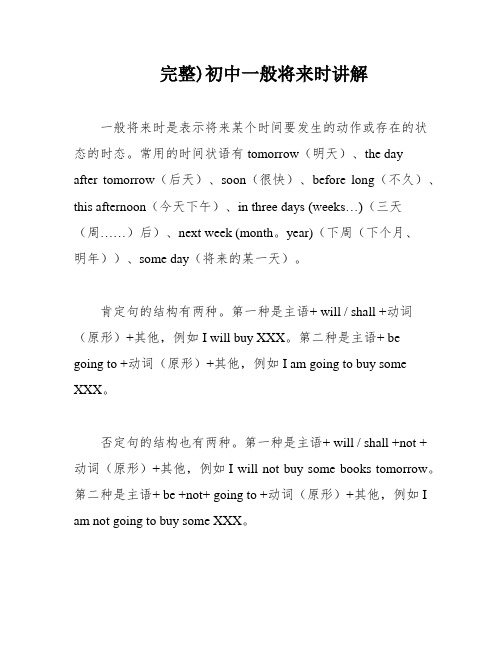
完整)初中一般将来时讲解一般将来时是表示将来某个时间要发生的动作或存在的状态的时态。
常用的时间状语有tomorrow(明天)、the dayafter tomorrow(后天)、soon(很快)、before long(不久)、this afternoon(今天下午)、in three days (weeks…)(三天(周……)后)、next week (month。
year)(下周(下个月、明年))、some day(将来的某一天)。
肯定句的结构有两种。
第一种是主语+ will / shall +动词(原形)+其他,例如I will buy XXX。
第二种是主语+ be going to +动词(原形)+其他,例如I am going to buy some XXX。
否定句的结构也有两种。
第一种是主语+ will / shall +not +动词(原形)+其他,例如I will not buy some books tomorrow。
第二种是主语+ be +not+ going to +动词(原形)+其他,例如I am not going to buy some XXX。
疑问句的结构也很简单。
第一种是Will / Shall +主语+动词原形+其他…?例如XXX?第二种是Be +主语+going to +动词原形+其他…?例如Are you going to buy some books tomorrow?肯定回答有两种方式。
第一种是Yes,主语+will,例如Yes。
I will。
第二种是Yes,主语+ be,例如Yes。
I am。
否定回答也有两种方式。
第一种是No,主语+will +not,例如No。
I will not。
第二种是No,主语+be + not,例如No。
I am not。
除了一般将来时,还有其他表示将来的时态,如be going to、be to(高中)、be about to(初中)。
初中英语语法汇总(一般将来时)

初中英语语法汇总(一般将来时)初中英语语法汇总〔一般将来时〕一、一般将来时的定义一般将来时表示在如今看来即将要发生的动作或存在的状态。
常用时间副词tomorrow, soon或短语next year / week / month, in a few days, in the future, sometime 做状语。
二、一般将来时的基本用法及构成〔1〕一般将来时的基本用法是表示单纯的将来事实,由"will / shall + 动词原形'构成:〔shall只用于第一人称〕例句:We shall have a lot of rain next month. 下个月将下许多雨。
I think she will pass the exam. 我想他考试会及格的。
〔2〕"be going to+动词原形'用来表示事先考虑过的将要发生的动作以及已有迹象说明必将要发生的某事,意为"准备;就要'。
如:1. Were going to meet outside the school gate. 我们准备在校门口见面。
2. Look! Its going to rain. 瞧!快下雨了。
(3) 用"be to+动词原形'表示。
主要表示按打算或支配即将要发生的动作;有时也表示指令、禁止或可能性:He is to leave for Beijing tomorrow. 他确定明天去北京。
Tell him hes not to be back late. 告知他不准迟回。
(4) 用"be about to+动词原形'表示。
主要表示即将要发生的事:He is about to leave. 他即将要离开。
Sit down, everyone. The film is about to start. 大家坐好,电影马上就要开发始了。
注:该结构通常不与具体的时间状语连用:误:He is about to leave soon [tomorrow].另外,该结构在美国英语中还可表示"准备'(主要用于否认句):Im not about to lend him any more money. 我不准备再借给他任何钱。
初中语法之一般将来时

初中语法之一般将来时一. shall/will+动词原形1.will可用于所有人称,但shall 仅表示单纯将来时,用于第一人称I和we,作为will的一种替代形式。
以You and I为主语时通常避免用shall。
例如:He will be back soon. 他很快就会回来。
I shall/will be free on Sunday. 星期天我有空。
2. will , shall可用来预言将来发生的事。
如说出我们设想会发生的事,或者请对方预言将要发生什么事。
例如:It will rain tomorrow. 明天将要下雨。
3. will , shall除可表示单纯的将来时以外,还可以带有意愿的色彩,仍指的是将来。
例如:I'll buy you a bicycle for your birthday. 你过生日时,我给你买一辆自行车。
(表示允诺)Will you open the door for me please? 请你帮我开门好吗?(表示请求)Shall I get your coat for you? 我可以为你拿外套吗?(表示提议)二. be going to+动词原形1. 表示说话人根据现在已有的迹象,判断将要或即将发生某种情况。
这类句子的主语可以是人,也可是物。
例如:There is going to be a football match in our school tomorrow afternoon. 明天下午我们学校将有一场足球赛。
(已有告示)I feel terrible . I think I'm going to die. 我感到难受极了,我想我快不行了。
Look at those black clouds ! It's going to rain. 看看那些乌云!天快要下雨了。
2. 表示主语现在的意图或现已作出的决定,即打算在最近或将来进行某事。
完整)初中英语一般将来时
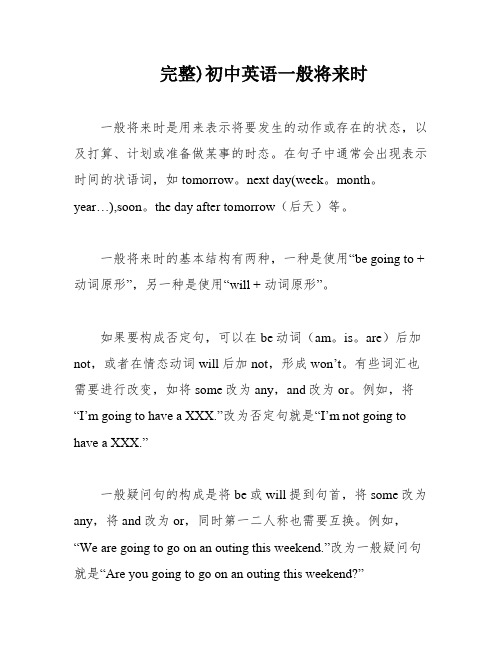
完整)初中英语一般将来时一般将来时是用来表示将要发生的动作或存在的状态,以及打算、计划或准备做某事的时态。
在句子中通常会出现表示时间的状语词,如tomorrow。
next day(week。
month。
year…),soon。
the day after tomorrow(后天)等。
一般将来时的基本结构有两种,一种是使用“be going to + 动词原形”,另一种是使用“will + 动词原形”。
如果要构成否定句,可以在be动词(am。
is。
are)后加not,或者在情态动词will后加not,形成won’t。
有些词汇也需要进行改变,如将some改为any,and改为or。
例如,将“I’m going to have a XXX.”改为否定句就是“I’m not going to have a XXX.”一般疑问句的构成是将be或will提到句首,将some改为any,将and改为or,同时第一二人称也需要互换。
例如,“We are going to go on an outing this weekend.”改为一般疑问句就是“Are you going to go on an outing this weekend?”对于划线部分的提问,一般将来时的对划线部分有三种情况。
第一种是问人,可以使用Who,例如“I’m going to New York soon.”改为问句就是“Who’s going to New York soon?”第二种是问干什么,可以使用What … do,例如“My father is going to watch a race with me this after noon.”改为问句就是“What is your father going to do with you this afternoon?”第三种是问什么时候,可以使用When,例如“She’s going to go to bed at nine.”改为问句就是“When is she going to bed?”同义句的构成是将be going to改为will,例如“I am going to go XXX.”可以改为“I will go XXX.”最基本的一般将来时结构是使用“will + 动词原形”,例如“XXX.”表示明天他们将要参观博物馆。
(完整版)初一下英语一般将来时

(完整版)初⼀下英语⼀般将来时第三讲:⼀般将来时⼀、定义:⼀般将来时表⽰将来某⼀时刻的动作或状态,或将来某⼀段时间内经常的动作或状态。
1.表⽰将来某⼀时刻的动作或状态:e.g. She will buy a new bike tomorrow.We will drive to the park next week.I shall visit my grandparents this weekend.They are going to play computer games this evening.I am going to have a big meal.2.将来某⼀段时间内经常的动作或状态:e.g. He is gong to have a big house next year .She will have a daughter.The cat will have a master.The dog will have a house.⼆、常与⼀般将来时连⽤的词:1. 时间状语系列:next Tuesdaynext weeknext yearthe coming Sundaythis afternoontomorrowtonightin a few minutesin the futurein five yearsfrom now onsoon三、⼀般将来时的构成1. will/shall的⼀般将来时构成:主语 + will/shall + 动词原形+其它I will/shall go to Beijing next week.主语是第⼀⼈称时 ----- shallwill not = won’tshall not= shan’t【活学活⽤】按照要求改写句⼦1、My teacher will teach us next term.(改为否定句)___________________________________________ 2、I shall not buy new clothes this month.(改为肯定句) ___________________________________________ 3、She is playing computer games.(改为将来时)___________________________________________ 4、We shan't take part in the football match.(改为肯定句) ___________________________________________ 5、I visit my grandparents every weekend.((改为将来时) ___________________________________________ 2. be going to的⼀般将来时构成:主语+ be going to + 动词原形+ 其他She is going to play basketball this afternoon.主语是”I”时 ----- am主语为单数时 ----- is主语为复数及you时 ----- are否定句的构成: 主语 + be not going to + 动词原形+ 其他She is not going to play basketball this afternoon.is not = isn’tam not = ’m notare not = aren’twill或shall与be going to区别:1. will或shall⽤法总结:1)表⽰⼀个将来的动作或状态,“要…,会…”She will go to the park tomorrow.2)表⽰不以⼈的意志为转移的⾃然发展的事。
初中英语语法——一般将来时详细讲解
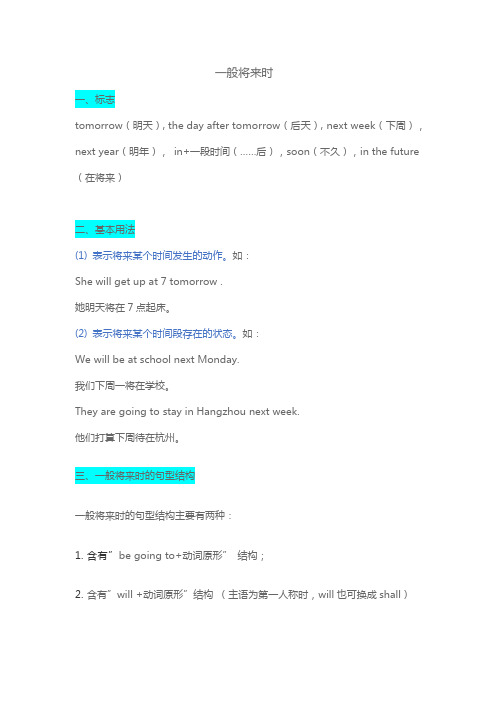
一般将来时一、标志tomorrow(明天), the day after tomorrow(后天), next week(下周),next year(明年),in+一段时间(……后),soon(不久),in the future (在将来)二、基本用法(1) 表示将来某个时间发生的动作。
如:She will get up at 7 tomorrow .她明天将在7点起床。
(2) 表示将来某个时间段存在的状态。
如:We will be at school next Monday.我们下周一将在学校。
They are going to stay in Hangzhou next week.他们打算下周待在杭州。
三、一般将来时的句型结构一般将来时的句型结构主要有两种:1.含有”be going to+动词原形”结构;2.含有”will +动词原形”结构(主语为第一人称时,will也可换成shall)(1)肯定句:She is going to buy some vegetables tomorrow morning . 她打算明天上午买一些蔬菜。
(2)否定句:在be动词后加not。
is和are可以和not缩写为isn't,aren't。
She isn’t going to buy any vegetables tomorrow morning . 她明天上午不去买蔬菜。
(3)一般疑问句及其答语:将be动词放在句子开头,且首字母要大写,句末用问号。
肯定回答:Yes,主语的相应代词+am/is/are.否定回答:No,主语的相应代词+am not /isn't/aren't.—Is she going to buy any vegetables tomorrow morning?她打算明天上午去买一些蔬菜吗?—Yes,she is./No,she isn't. 是的,她打算去。
初中英语语法一般将来时精华版

一般未来时◆一般未来时主要有以下几种表现形式由助动词 shall或will加动词原形组成,shall用于第一人称,will用于第二、三人称。
除英外国的说英语的国家,在陈说句中,即便在第一人称一般也用will,在英国也有这种趋向。
在口语中,常用shall, will的缩写形式为’ ll,如:I’ ll, you’ll等。
Shall not的缩写式为:shan’ t, will not的缩写式为:won’ t.一定句: I/We shall/will go.You/He/She/They Will go.否认句: I/We shall/will not go.You/He/She/They Will not go.疑问句: Shall I/we go?Will you/he/she/they go?◆一般未来时用法( 1)一般未来时表示将要发生的动作或状况。
比如: I will(shall) arrive tomorrow.我明日到。
Will you be free tonight?你今夜有空吗We won ’t (shan ’t) be busy this evening.我们今夜不忙。
(2)在一般未来时的句子中,有时有表示未来时间的状语,有时没有时间状语,这时要从意思上判断能否指未来的动作或状况。
比如:Will she come?她(会)来吗We ’ ll only stay for two weeks.我们只待两礼拜。
The meeting won’t last long.会开不了多久。
(3)在以第一人称 I 或 we 作主语的问句中,一般使用助动词 shall ,这时或是征采对方的建议 (a) ,或是咨询一个状况 (b) :a. Where shall we meet?我们在哪儿碰头b. Shall we have any classes tomorrow?明日我们有课吗在这种问句中,最近几年来也有许多人用will,特别是在美国。
- 1、下载文档前请自行甄别文档内容的完整性,平台不提供额外的编辑、内容补充、找答案等附加服务。
- 2、"仅部分预览"的文档,不可在线预览部分如存在完整性等问题,可反馈申请退款(可完整预览的文档不适用该条件!)。
- 3、如文档侵犯您的权益,请联系客服反馈,我们会尽快为您处理(人工客服工作时间:9:00-18:30)。
初中英语大凡将来时知识点的从零到醒目的学习,有语法知识,有针对性的练习题,有答案!经本人整理,小孩练习,确实有用!肯定形式:①am/is/aregoing to + do;②will/shall + do.否定形式:①am/is/are notgoing to + do;②will/shall not + do.will (is going to) be一表将来某一个时间将要发生的动作或存在的状态二.大凡将来时的标志:tomorrow(明天),the day after tomorrow(后天)next year(明年)next month(下一个月)next week(下一个星期)三.大凡将来时的构成:1.主语+be(am,is,are) going to+动词原形(do)+......2.主语+will/shall+动词原形(do)+.....说明:(1).will/shall有时可以和be going to互换;(2).will是万能的,shall只能用在第一人称,主语是I,we.(3).will和shall的后面接动词原形(do))四.大凡将来时的句式:1.肯定句:(1)..主语+be(am,is,are) going to+动词原形(do)+......(2)..主语+will/shall+动词原形(do)+.....2.否定句:(1)..主语+be(am,is,are)not going to+动词原形(do)+......(2)..主语+will/shall not+动词原形(do)+.....3.大凡疑问句:(1).Am/Is,Are+主语+going to+动词原形(do)+....(2).Will//shall+主语+动词原形(do)+...4.分外疑问句:(1).What (Where, How...)+be (am,is,are)+主语+ going to +动词原形(do)+...?(2). What (When,Where,How...) +will/shall+主语+动词原形(do)+...?二、基本结构:①be going to + do;②will+ do.三、否定句:在be动词(am, is, are)后加not或will后加not成won’t。
例如:I’m going to have a picnic this afternoon.→I’m not going to have a picnic this afternoon.四、大凡疑问句:be或will/shall提到句首,some改为any,and改为or,第一二人称互换。
例如:We are going to go on an outing this weekend.→Are you goin g to go on an outing this weekend?五、对划线部分提问。
大凡情况,大凡将来时的对划线部分有三种情况。
1.问人。
Who例如:I’m going to New York soon.→Who’s going to New York soon.2.问干什么。
What…do.例如:My father is going to watch a race with me this afternoon.→What is your father going to do with you this afternoon.3.问什么时候。
When.例如:She’s going to go to bed at nine.→When is she going to bed?一表将来某一个时间将要发生的动作或存在的状态二.大凡将来时的标志:tomorrow(明天),the day after tomorrow(后天)next year(明年)next month(下一个月)next week(下一个星期)三.大凡将来时的构成:1.主语+be(am,is,are) going to+动词原形+......例如:(1).I am going to play football tomorrow.明天我将要踢足球.(2).She is going to watch a movie the day after tomorrow.后天她要看一场电影.2.主语+will/shall+动词原形+.....** ***说明:(1).will/shall有时可以和be going to互换;(2).will是万能的,shall只能用在第一人称,主语是I,we.(3).will和shall的后面接动词原形)例如:(1).Ishall/willgotoBeijingnextmonth.(Iwill=I“ll)下个月我将要去北京.(2).You will come to see me tomorrow.(you will=you“ll)明天你将要来看我.(3).She will read English tomorrow morning.(She will=She“ll)明天早上她将要读英语.四.句大凡将来时的式:1.肯定句:(1)..主语+be(am,is,are) going to+动词原形+......(2)..主语+will/shall+动词原形+.....例句和上面一样,就不举了.2.否定句:(1)..主语+be(am,is,are)not going to+动词原形+......例如:(A): I am not going to play basketball tomorrow.明天我不将踢足球.(B). She is not/isn“t going to visit Shanghai next year.明年她不将参观上海.(2)..主语+will/shall not+动词原形+.....(A). I shall not go to school the day after tomorrow。
后天我不将上学了(B). I will not writemy homeworkthis evening.(will notl=I won“t)今晚我不将写作业(C). She will not see a movie next week.(will not=won“t)下个星期她将不看一场电影.3.大凡疑问句:(1).Am/Is,Are+主语+going to+动词原形+....例如(A). --Am I going to see my grandfather tomorrow?明天我将去看我的爷爷吗?--Yes,you are.是的,你将去.(B).-- Are you going to listening to the tape tomorrow?明天你将听录音带吗?---No,I am not.不,我不将.(C). --Is she going to Beijing next year?明年我将去北京吗?--Yes,she is.是的,她将.(2).Will//shall+主语+动词原形+...例如(A). --Shall we play volleyball next class?下一节课我们将打排球吗?--Yes,you will.是的,你们将.(B). --Will you come here next week?下个星期你将来这儿吗?--Yes,I will.是的,我将.(C).--Will she teach us this term?这学期,她将教我们吗?--Yes,she will.是的,她将.4.分外疑问句:(1).What(Where,How...)+be(am,is,are)+主语+going to+动词原形+...?例如:(A).--What are you going to do tomorrow?明天你将要做什么?--I“m going to the park?我将要去动物园.(B).--Where are you going to swim?你将要去哪儿游泳?--I“m going to swim in the river.(2). What(When,Where,How...)+主语+动词原形+...?例如:(A).---What will you do next week?下个星期你将要做什么?---I will do my homework。
我将要做作业.(B).--Howwillshecomeheretomorrow?明天她将要怎么来这儿?--She will come here by bus。
她将要乘公共汽车来这儿.补充说明有些词如:go(去),come(来),leave(离开),start(开始),arrive等用现在进行时表示将来时.例如:(1)She is coming here tomorrow.她明天将要来这儿.(2)When are you leaving here?你什么时间将要离开这儿?区别“Begoingto+动词原形+...“表示一个事先考虑好的意图,,相当于文中的“打算,计划,准备“例如:(1).I am going to spend my holiday in Beijing.(这里不能用will)我打算在北京度假.(2).Where are you going to spend your holiday?你将要到哪儿度假?3.客观难以改变的事实,用will,而不用be going to .例如:(1).It will rain tomorrow.明天将要下雨.(2).It will be Teachers“ Day the day after tomorrow.后天将是教师节.(3).My birthday will come.我生日将要到了.“will”句型与“be going to”句型,前者表示纯正将来,后者表示打算、计划、准备做的事情,更强调主语的主观意愿。
例如:Tomorrow will be Saturday.明天是周六了。
We are going to visit Paris this summer.今年夏天我们打算游览巴黎。
大凡将来时练习一、用所给动词的大凡将来时填空1. I ______(leave)in a minute. I ______(finish)all my work before I ______(leave).2.—How long _______ you _______(study)in our country?—I _______(plan)to be here for about one more year.—I _______(hope)to visit the other parts of your country.—What ______ you ______(do)after you ______(leave)here?—I ______(return)home and ______(get)a job.3. I ______(be)tired. I ______(go)to bed early tonight.4.Mary’sbirthda y is next Monday, her mother _____(give)her a present.5. It is very cold these days. It ______(snow)soon.6.—_____ you _____(be)here this Saturday?—No. I ______(visit)my teacher.7.—______ I ______(get)you a copy oftoday’snewspaper?—Thank you.8. I am afraid there ______(be)a meeting this afternoon. Ican’tjoin you.9. Mike ______(believe, not)this until he ______(see)it with his own eyes.10. Most of usdon’tthink their team ______(win).二、单项选择1. There __________ a meeting tomorrow afternoon.A.willbegoingtoB.willgoingtobeC.isgoingtobeD. will go to be2. Charlie ________ here next month.A.isn’tworkingB.doesn’tworkingC.isn’tgoing to workingD.won’twork3. He ________ very busy this week, he ________ free next week.A. will be; isB. is; isC. will be; will beD. is; will be4. There ________ a dolphin show in the zoo tomorrow evening.A. wasB. is going to haveC. will haveD. is going to be5.–________ you ________ free tomorrow?–No. I ________ free the day after tomorrow.A. Are; going to; willB. Are; going to be; willC. Are; going to; will beD.Are; going to be; will be6. Mother ________ me a nice present on my next birthday.A. will givesB. will giveC. givesD. give7.–Shall I buy a cup of tea for you?–________.(不,不要。
